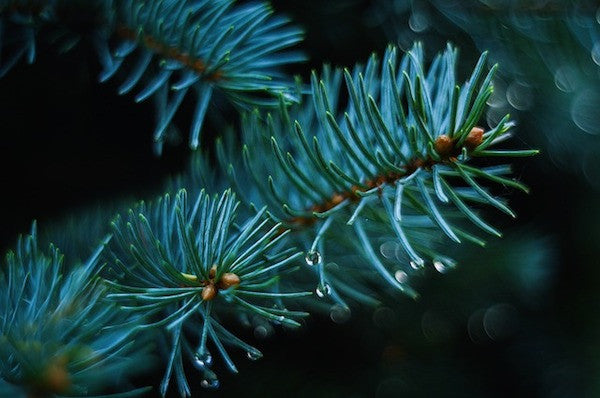
Holiday Plants: Dangerous for Your Pets?
Share
The holidays can be a wonderful time for our pets – Santa sometimes brings gifts for good little cats and dogs, too! – but sometimes these well-meaning celebrations and decorations can be dangerous for our furry family members.
One of the biggest culprits? Holiday plants, which we all know curious pets love to get into. Here I’ll address the most popular plants and flowers we have in our homes around the end of the year. Some may only cause mild issues if ingested, whereas others may be deadly. Don't fret - I'll also talk about ways to protect your pets while also maximizing your holiday decor.
Dangerous Plants for Dogs and Cats
Amaryllis

- Dogs: Toxic
- Cats: Toxic
Amaryllis can cause digestive issues (like vomiting, diarrhea, pain, and decreased appetite) as well as lethargy and tremors in both dogs and cats. All parts of the plant – including the bulb – are dangerous to ingest.
Christmas Cactus

- Dogs: Nontoxic but irritating
- Cats: Nontoxic but irritating
The Christmas Cactus may not be toxic, but the fibrous plant material itself may irritate the digestive tract. This may lead to vomiting or diarrhea in both dogs and cats.
Christmas Trees

- Dogs: Nontoxic but irritating
- Cats: Nontoxic but irritating
Fir trees – a popular choice for families who celebrate Christmas – produce oils that could irritate an animal’s mouth or stomach if they ingest needles or even bark. This irritation may lead to vomiting or diarrhea (seeing a pattern here yet?).
The sharp needles of a fir tree could puncture the lining of a tiny digestive tract, whish is unsurprisingly very dangerous.
Finally, the tree’s water – a breeding ground for bacteria and other nasty organisms – could lead to digestive problems if ingested by thirsty animals. Avoid this issue by changing the water regularly and providing pets with fresh bowls of clean water as a more palatable alternative.
Holly & Mistletoe

- Dogs: Toxic
- Cats: Toxic
Talk about popular Christmas plants! Holly and mistletoe leaves and berries can cause all sorts of issues for pets, including drooling, vomiting, and diarrhea. Mistletoe in particular can cause other concerning symptoms like breathing problems, drop in blood pressure, and seizures. This can lead to death if your pets ingest enough of the plant.
Lilies & Daffodils

- Dogs: Potentially toxic
- Cats: Toxic
There are quite a few types of popular lilies and daffodils out there, but many varieties are dangerous for both dogs and cats (especially cats). Daffodils are definitely out of the question for both dogs and cats. Lilium and Hemerocallis lilies are the ones to stay away from – in cats, they can cause convulsions and arrhythmias.
Poinsettia

- Dogs: Nontoxic (usually) but irritating
- Cats: Nontoxic (usually) but irritating
Poinsettia is one of those plants that many people believe is dangerous for pets and children. As it turns out, it’s not quite as problematic as some of the other plants on this list (like lilies, for example).
Pets may vomit if they ingest the leaves, but they would have to eat quite a bit of the plant for it to be toxic. If, however, the plant has been treated with pesticides, animals may exhibit more severe reactions like seizures.
What to Do if Your Pet Ingests a Toxic Plant
If you think your dog or cat has ingested something dangerous, here are the steps you should take to make sure your pet stays healthy and happy:
- Identify the ingested substance. What exactly did your pet eat, if anything? This could be very important when it comes to treatment.
- Call your vet or poison control center. It would be best to call your veterinarian if your pet has ingested something dangerous during normal business hours, but if your vet isn’t open, call a Poison Control Center. Your vet or poison control expert should be able to tell you what to do next – you may have to make your pet vomit up the toxin in order to prevent absorption, for example.
- Bring your pet in for medical attention. If your pet ate something toxic or something that could irritate/puncture her digestive tract, it’s important that she sees a medical professional as soon as possible. The sooner you bring your animal in to the vet or animal hospital, the more likely they’ll be able to prevent permanent damage.
Holiday Alternatives: Safe Plants for Your Pets
To be extra safe around the holidays, you may want to take steps to protect the pets (and young children) in your home who may be curious about new plant additions. Some safe, nontoxic alternatives include:
- Artificial or silk plants
- Ferns
- Orchids
- Spider plants
- Succulents
- Air plants
If in doubt about a potential plant, do a quick google search before bringing it within reach of curious pets. Remember, have a safe and happy holiday season from Pawfect Pets!
